Ah, we’ve finally arrived. I didn’t know we were journeying to this destination in season one of DS9, but none-the-less, we find ourselves here. It turns out the journey was worth the wait.
Primary Plot
I’m sensing a trend here. The best episodes of DS9 so far seem to be the bottle episodes.
The plot of Duet is simple. The plot of Duet is complicated. The plot of Duet takes place entirely via exposition disclosed during conversation. It is the least “Star Trek-y” of plots that has occurred so far this season, but it has the biggest impact on me.
A Cardassian is on a ship that just happens to be passing through, and he has some extremely rare disease and has suspiciously forgotten his medication. The ship stops at DS9 for medical assistance.
It turns out the disease was only ever contracted by those in a particular place at a particular time. The place was a prison/labor camp run by the Cardassians where they kept Bajoran dissidents and political prisoners. The particular time was at the end of the camp. There was some kind of event and those there were exposed to and contracted this MacGuffin disease.
Kira the Defiant is, but this time possibly not needlessly. She really is showing growth. Her emotions, however, are off the charts and nearly incontrollable. She believes this Cardassian to be an evil villain, and she aims to see justice done upon him.
The Cardassian is played by this man, Harris Yulin:
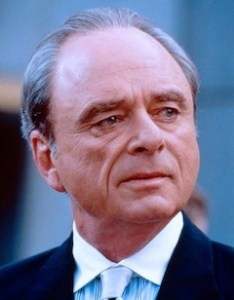
He’s in just gobs of stuff. It is rare that he has a major role, but if you know who he is you’ll see him all over the place. He’s the judge during the courtroom scene in Ghostbusters 2 during Louis Tully’s “short, but pointless” speech. He plays Cutter in Clear and Present Danger. He’s the mafia guy who fixes tickets in Frasier. He’s in so many shows and movies that it is hard not to recognize him, but you’ll usually have a difficult time placing him. That is a shame, because he’s a damn fine actor, and he shows it here.
DS9 plays all their trope cards on this one. The Cardassian is clearly the Nazi, and he’s dressed appropriately for the role. He denies, denies, denies to Kira’s interrogation, insisting that it is all one big misunderstanding, that Kira has been lied to and deceived by both her memory and the political propaganda of her own side. He gaslights her for all he’s worth, and he’s absolutely believable for every minute of it. He says he was just the clerk at the camp, and there were no screams, no murders. Deaths, yes, but labor camps are hard and brutal, and people do die there, but no, the Cardassians didn’t kill anyone.
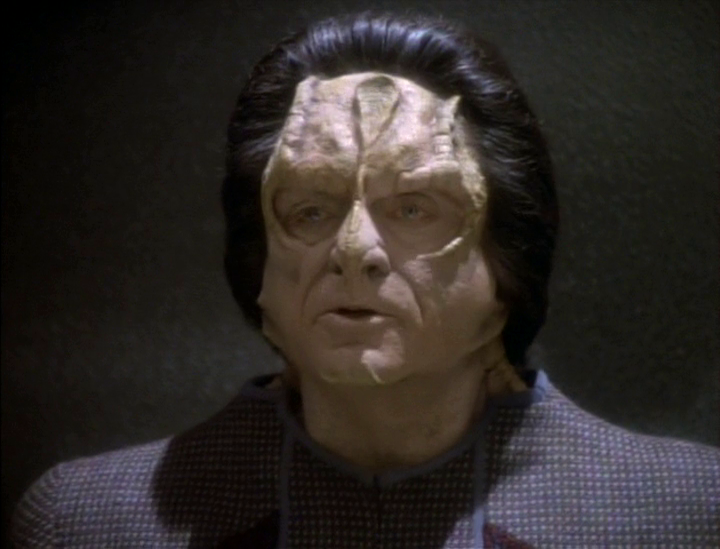
Until Kira catches him in a lie. Then he not only admits, but he revels, revels, and revels some more in his evil doings. He taunts Kira. He exhibits no remorse, he makes himself out to be a monster, and then he laughs and says it doesn’t concern him at all. He makes it clear that the Bajorans are not people. Who cares if they die? Again, he plays the part perfectly. He is absolutely believable in this new role as well, and you marvel at the deception he has portrayed earlier. He was the camp commandant, and he reveled in the screams and the deaths.
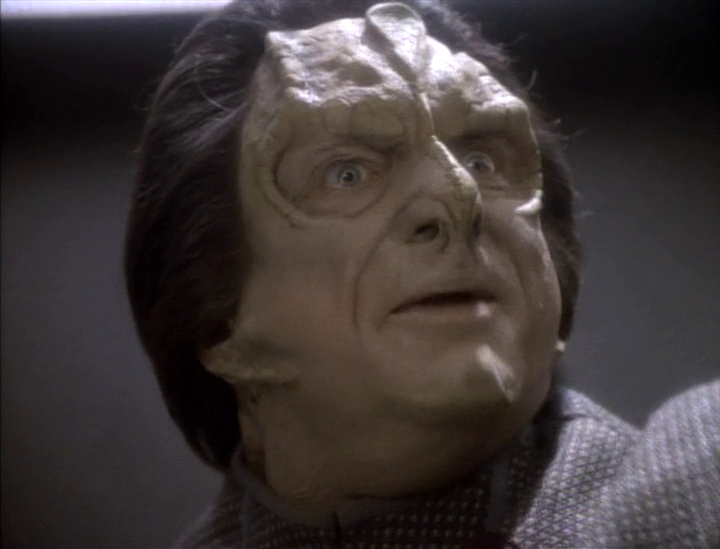
And still the plot unfolds, with additional twists, turns, and discoveries. Kira confronts him three or four times, and each time he’s a different character. He isn’t the camp commandant after all. That Cardassian has been dead for years, with a very public State funeral. He’s had surgery to look like the guy he’s impersonating, but why? He denies all of that still, says the funeral was a fake. Do they have evidence of who was truly buried? He is playing for a public show trial on Bajora, to be convicted and sentenced and executed in a very public manner.
Kira continues to push him, coming back for confrontation after confrontation, doubting herself, putting herself through an emotional wringer. We discover that he was at the camp. He does have the disease. He was the clerk, and he did hear the screams, and he is tortured even now. He longs for death. He longs for justice. He could do nothing for the Bajorans who were tortured and killed, but he didn’t even try. He is a self-declared coward who desires to be executed for what he has done, and what he has failed to do. This is suicide not by cop, but by firing squad.
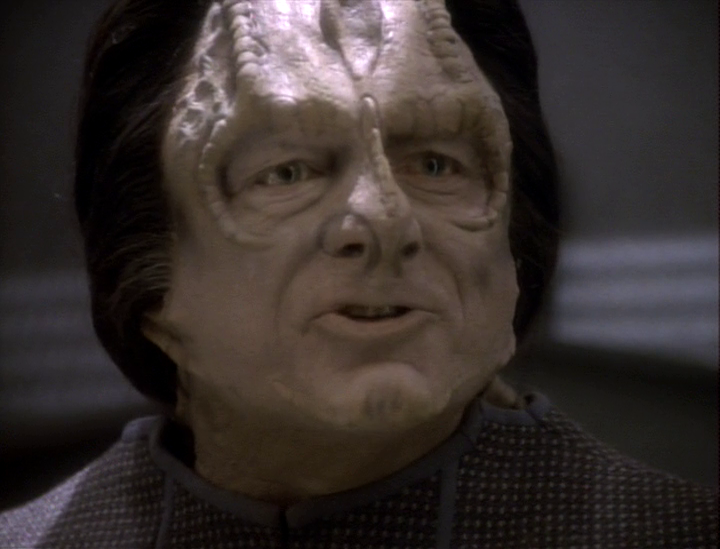
Kira and Sisko let him go! He’s distraught. He knows not what he will do. He desired to force the Cardassian empire to face their crimes through his public show trial and death, and now nothing will come of it.
Before anyone can determine his fate, before he can decide what to do next, he’s stabbed in the back by a Bajoran looking to kill him because he’s a Cardassian. The Bajoran doesn’t know who he is, what he’s done, or what he is guilty of. He’s a Cardassian, and therefore fit to die, and die he does.
His death, long wished for, is now an unfulfilled tragedy, lacking in all meaning.
Other Thoughts
There are no side plots in this one. Just one fantastic story told with expertise from the writing, the direction, and certainly the acting. This one episode rises further than I thought DS9 could achieve, and it does it with someone I consider one of the weaker characters in Kira.
This episode explores so many things. Guilt, innocence, forgiveness, sins of omission, damaged and broken psyches, self-hatred, racism, propaganda, temperance… it is ALL here.
Watching Mr. Yulin act under the Cardassian makeup was pure joy. He really is a great actor, and he exhibits it here. He’s never over-the-top, but he is very intense when he wants to be and needs to be. He plays the maniacal villain; the innocent victim; the fragile, misunderstood young man; the lost soul; the idealogue; the hero; and someone looking for a friend—and he does it all nearly at the same time, moving effortlessly between these aspects of his character when the scenes and the plot needs it.
It is an amazing performance, and you shouldn’t miss it. If you are reading this, and haven’t seen this episode of DS9, go watch it at your earliest option. You don’t need any background on the setting, and even non-Trek-fans can appreciate and enjoy what is done here. I have no complaints, no critiques.
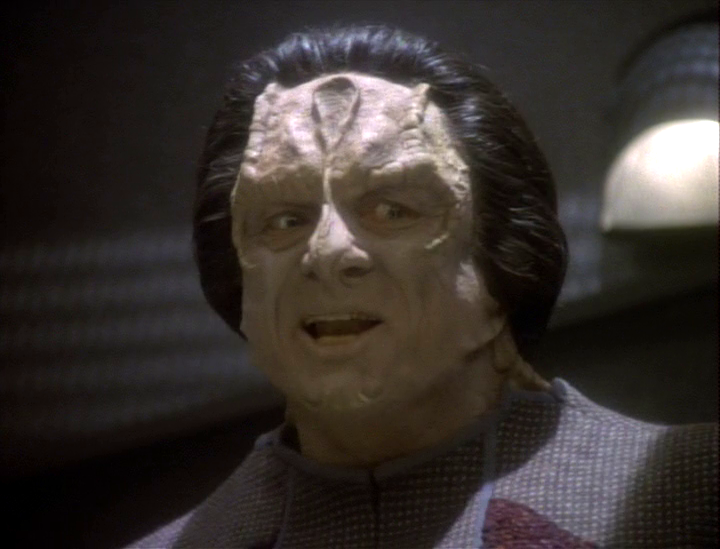
Final Grade: A
Drake wanted to know if I was going to give this one an A+. It was close. This is one of the best Star Trek episodes I’ve seen, rivaling some of the best TNG and Enterprise episodes. It is truly a great episode of TV regardless of the series or genre, and it works so well partly because it isn’t tied to the genre.
The MacGuffin is the MacGuffin, but it doesn’t matter. You know there’s a MacGuffin, here’s the actors, and go. The rest could be a scene from a WW2 movie, or a courtroom drama, or nearly anywhere else in history. Nothing in this episode requires it to be a Star Trek episode to work, and because of that it breaks out of the Star Trek mold and becomes primal and timeless.
It is great TV. Is the one of the best TV episodes you’ll ever see? Well…
I don’t know. I’m not sure of that. Maybe, but I kinda doubt it. A+ episodes need to marinate a bit in memory. They need to really stick with you and be remembered, and even influence you, long into the future. I’ve seen this episode exactly one time.
Was I impressed by it? Heck yes, I was. I would recommend this episode to anyone.
But the best of the best of TV? Too early to say.
